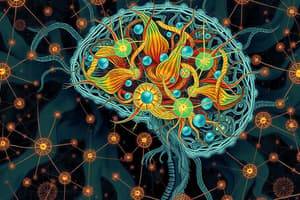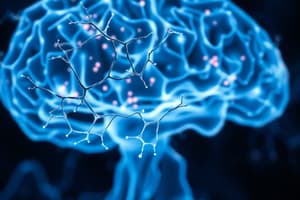Podcast
Questions and Answers
Which of the following neurotransmitters plays a key role in shaping our emotions and cognitive processes?
Which of the following neurotransmitters plays a key role in shaping our emotions and cognitive processes?
- Glutamate
- Acetylcholine
- Serotonin (correct)
- GABA
Which neural system is responsible for emotional well-being, decision-making, and memory formation?
Which neural system is responsible for emotional well-being, decision-making, and memory formation?
- Occipital lobe
- Motor cortex
- Cerebellum
- Prefrontal cortex (correct)
What is the role of the hypothalamic-pituitary-adrenal (HPA) axis in human behavior?
What is the role of the hypothalamic-pituitary-adrenal (HPA) axis in human behavior?
- Controlling body temperature
- Regulating sleep cycles
- Regulating blood sugar levels
- Influencing stress response (correct)
Which of the following is a critical skill that research methods help AP Psychology students develop?
Which of the following is a critical skill that research methods help AP Psychology students develop?
What does biological psychology focus on in its examination of human behavior?
What does biological psychology focus on in its examination of human behavior?
Why is a solid understanding of experimentation important in AP Psychology?
Why is a solid understanding of experimentation important in AP Psychology?
What is a key aspect emphasized in the text regarding experimentation in AP Psychology?
What is a key aspect emphasized in the text regarding experimentation in AP Psychology?
Which statistical tests are mentioned in the text as tools for determining significant relationships between variables?
Which statistical tests are mentioned in the text as tools for determining significant relationships between variables?
What does the text suggest about the role of replication in psychological research?
What does the text suggest about the role of replication in psychological research?
How does the text describe the process of designing experiments in AP Psychology?
How does the text describe the process of designing experiments in AP Psychology?
What does the text suggest about the relationship between statistical analysis techniques and drawing conclusions in psychology?
What does the text suggest about the relationship between statistical analysis techniques and drawing conclusions in psychology?
What skills can be developed through hands-on experimentation in AP Psychology?
What skills can be developed through hands-on experimentation in AP Psychology?
Study Notes
Exploring Human Behavior through AP Psychology
As you delve into the exciting world of Advanced Placement (AP) Psychology, you'll encounter a dynamic blend of fascinating theories, groundbreaking research, and captivating subtopics that shape our understanding of human behavior. In this article, we'll explore three key aspects of AP Psychology: biological psychology, research methods, and experimentation.
Biological Psychology: The Body's Influence
Biological psychology, also known as neuropsychology, is a subfield that examines the interplay between brain function and behavior. This subtopic delves into the complexities of the nervous system, exploring how neural pathways and chemical transmitters shape our thoughts, emotions, and actions.
By investigating biological psychology, you'll discover:
- The role of neurotransmitters like dopamine, serotonin, and norepinephrine in shaping our emotions, moods, and cognitive processes.
- Neural systems like the limbic system, the prefrontal cortex, and the amygdala, and how they contribute to our emotional well-being, decision-making, and memory formation.
- The intricate connections between our brain and body, such as the hypothalamic-pituitary-adrenal (HPA) axis that influences our stress response.
Research Methods: The Science of Psychology
A solid understanding of research methods is critical for AP Psychology students, as it enables you to evaluate the reliability and validity of various studies and experiments. This subtopic helps you develop a scientific mindset, sharpen your critical thinking skills, and prepare you for future research endeavors.
By studying research methods, you'll learn:
- The importance of establishing a hypothesis, experiment design, and proper experimental control in psychological research.
- Different types of research designs, including descriptive, correlational, and experimental studies, and their strengths and limitations.
- The role of statistical analysis in psychology, including techniques like hypothesis testing, regression analysis, and analysis of variance (ANOVA) to draw meaningful conclusions from data.
Experimentation: The Art of Discovery
Experimentation is a cornerstone of AP Psychology, as it allows you to test and validate the theories and hypotheses that you've learned about in the classroom. Through hands-on experimentation, you'll develop important skills in data collection, data analysis, and the scientific method.
By engaging in experimentation, you'll discover:
- The importance of designing experiments that minimize confounding variables, maintain experimental control, and yield accurate results.
- Common statistical tests, like the t-test and chi-square test, and how they help you determine whether a significant relationship exists between variables.
- The value of replication and research transparency in advancing the field of psychology.
AP Psychology is an exciting and challenging subject that encourages students to delve into the fascinating world of human behavior. By exploring the intricacies of biological psychology, research methods, and experimentation, you'll lay the groundwork for a future career in psychology, neuroscience, or related fields. As you embark on this journey, keep a critical and analytical mindset, and always strive for accuracy and integrity in your research and experimentation efforts.
Studying That Suits You
Use AI to generate personalized quizzes and flashcards to suit your learning preferences.
Description
Delve into the captivating world of Advanced Placement (AP) Psychology with an exploration of biological psychology, research methods, and experimentation. Learn about neurotransmitters, neural systems, research designs, statistical analysis, experimental design, and the scientific method.




